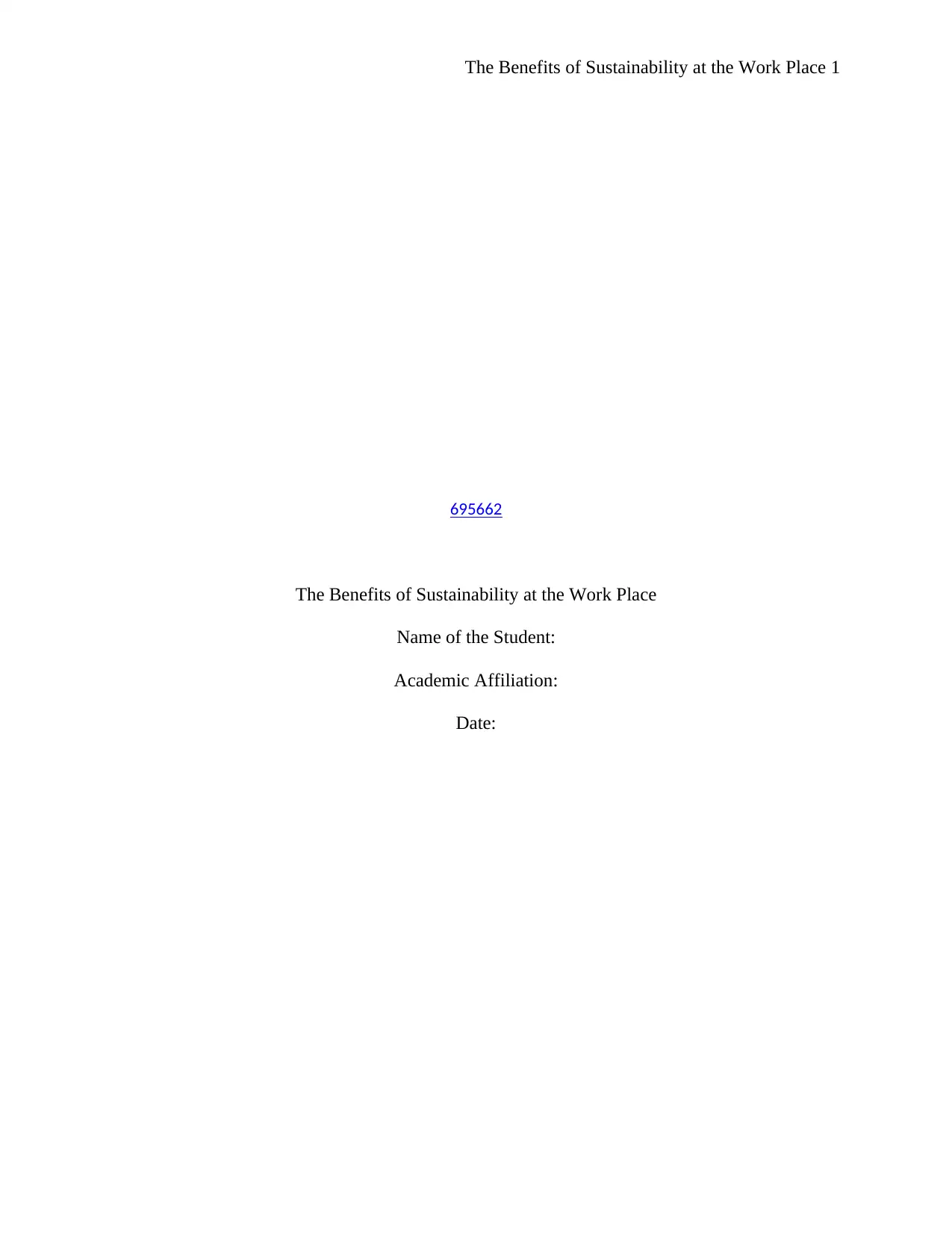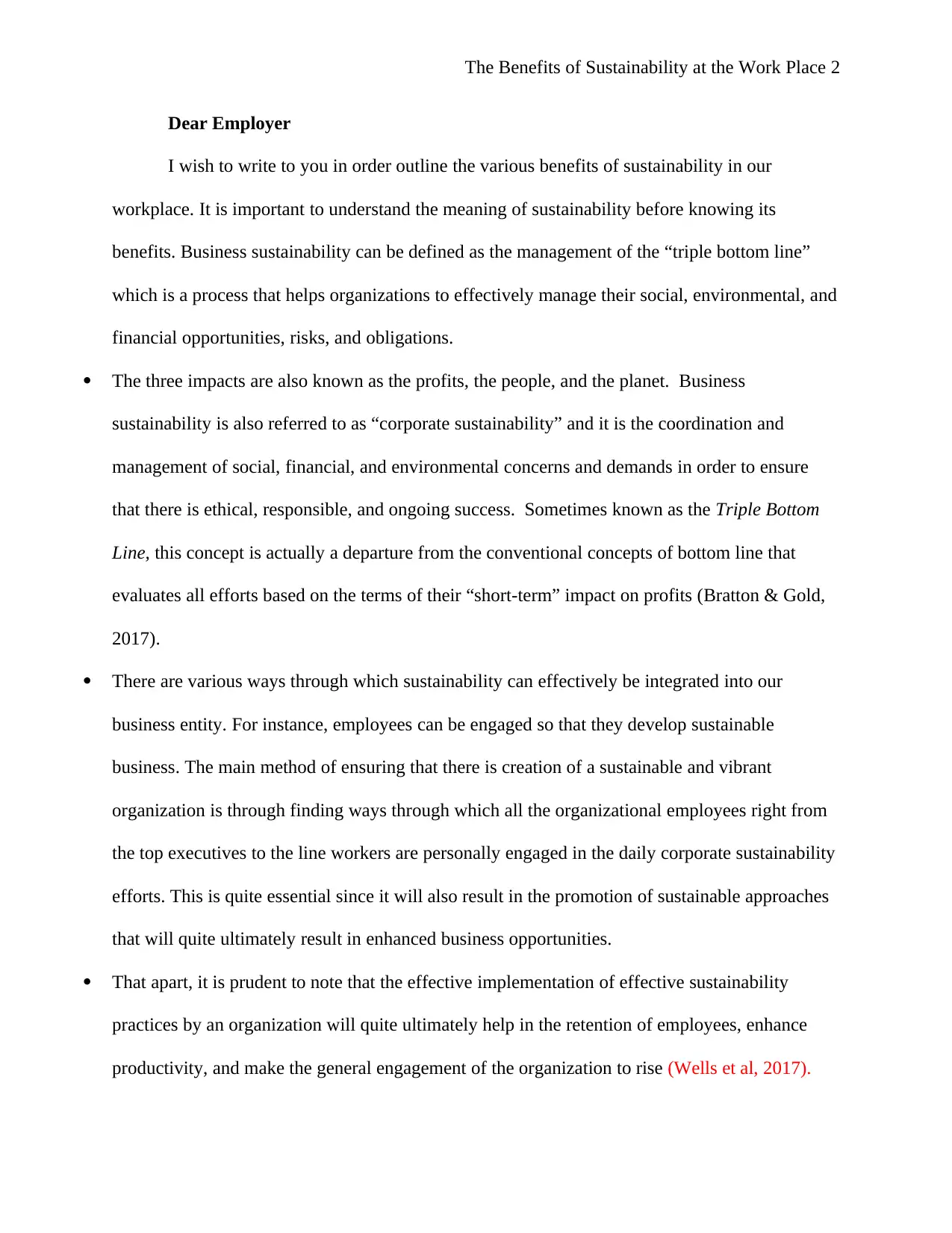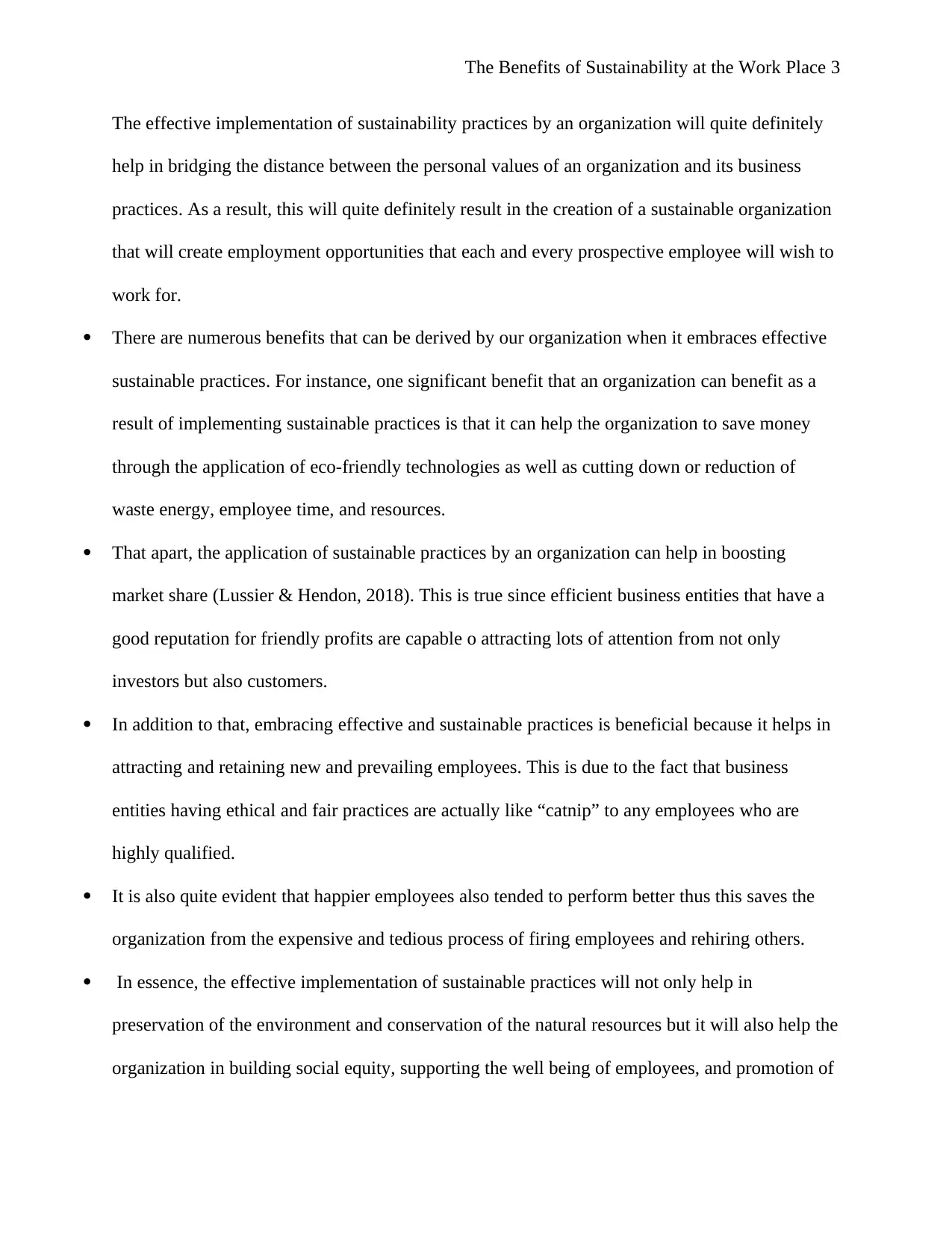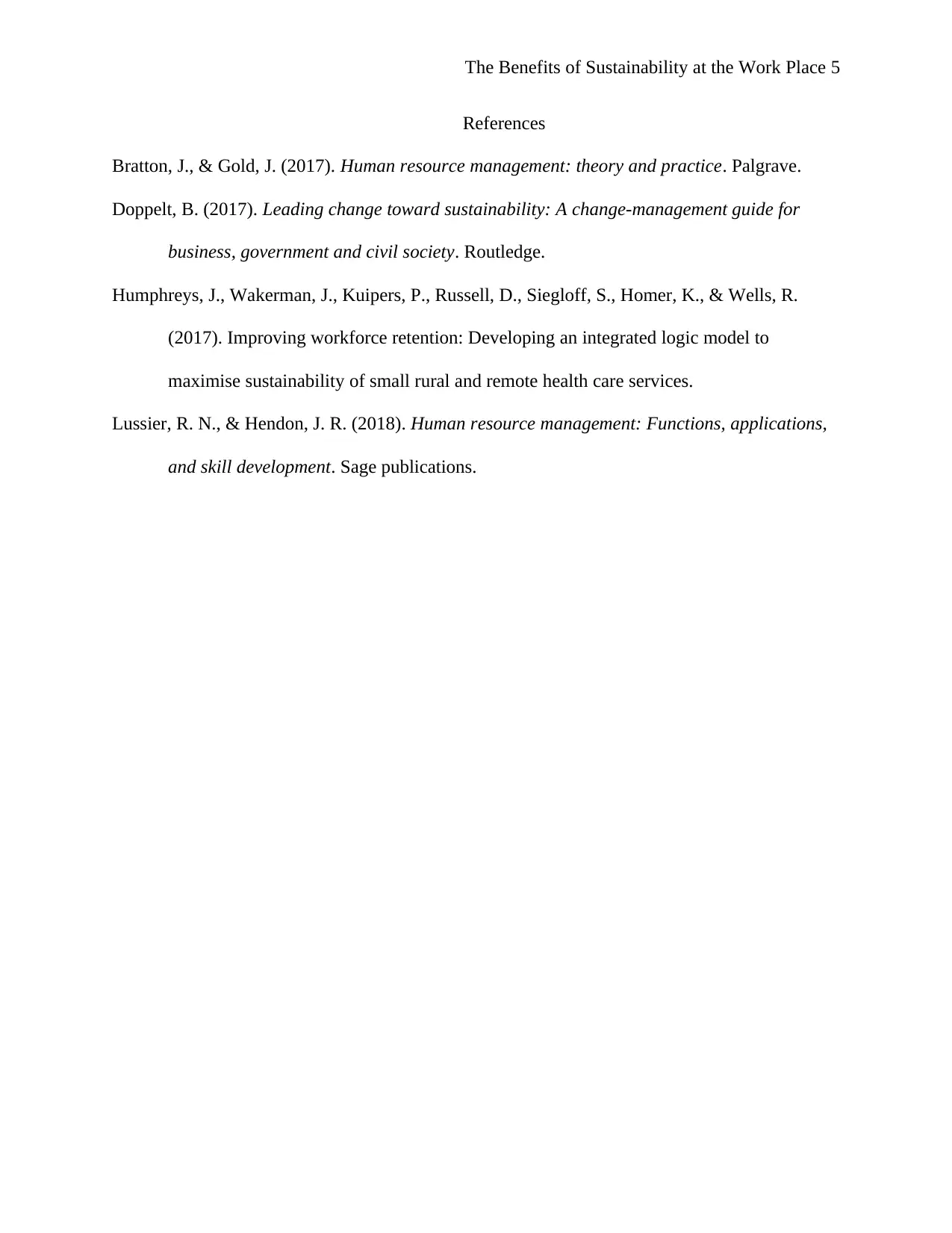Report: The Benefits of Sustainability in the Workplace
VerifiedAdded on 2021/04/21
|5
|832
|442
Report
AI Summary
This report, addressed to an employer, outlines the various benefits of integrating sustainability into the workplace. It defines business sustainability as the management of the "triple bottom line"—profits, people, and the planet—and emphasizes the importance of engaging employees in sustainable practices. The report details how sustainability can lead to cost savings through eco-friendly technologies, boost market share by attracting customers and investors, and improve employee retention by creating a desirable work environment. It highlights that happier employees perform better, reducing turnover costs, and emphasizes the broader benefits of promoting social equity, employee well-being, fair trade, and long-term organizational profitability and growth. The report references several academic sources to support its claims.

The Benefits of Sustainability at the Work Place 1
695662
The Benefits of Sustainability at the Work Place
Name of the Student:
Academic Affiliation:
Date:
695662
The Benefits of Sustainability at the Work Place
Name of the Student:
Academic Affiliation:
Date:
Paraphrase This Document
Need a fresh take? Get an instant paraphrase of this document with our AI Paraphraser

The Benefits of Sustainability at the Work Place 2
Dear Employer
I wish to write to you in order outline the various benefits of sustainability in our
workplace. It is important to understand the meaning of sustainability before knowing its
benefits. Business sustainability can be defined as the management of the “triple bottom line”
which is a process that helps organizations to effectively manage their social, environmental, and
financial opportunities, risks, and obligations.
The three impacts are also known as the profits, the people, and the planet. Business
sustainability is also referred to as “corporate sustainability” and it is the coordination and
management of social, financial, and environmental concerns and demands in order to ensure
that there is ethical, responsible, and ongoing success. Sometimes known as the Triple Bottom
Line, this concept is actually a departure from the conventional concepts of bottom line that
evaluates all efforts based on the terms of their “short-term” impact on profits (Bratton & Gold,
2017).
There are various ways through which sustainability can effectively be integrated into our
business entity. For instance, employees can be engaged so that they develop sustainable
business. The main method of ensuring that there is creation of a sustainable and vibrant
organization is through finding ways through which all the organizational employees right from
the top executives to the line workers are personally engaged in the daily corporate sustainability
efforts. This is quite essential since it will also result in the promotion of sustainable approaches
that will quite ultimately result in enhanced business opportunities.
That apart, it is prudent to note that the effective implementation of effective sustainability
practices by an organization will quite ultimately help in the retention of employees, enhance
productivity, and make the general engagement of the organization to rise (Wells et al, 2017).
Dear Employer
I wish to write to you in order outline the various benefits of sustainability in our
workplace. It is important to understand the meaning of sustainability before knowing its
benefits. Business sustainability can be defined as the management of the “triple bottom line”
which is a process that helps organizations to effectively manage their social, environmental, and
financial opportunities, risks, and obligations.
The three impacts are also known as the profits, the people, and the planet. Business
sustainability is also referred to as “corporate sustainability” and it is the coordination and
management of social, financial, and environmental concerns and demands in order to ensure
that there is ethical, responsible, and ongoing success. Sometimes known as the Triple Bottom
Line, this concept is actually a departure from the conventional concepts of bottom line that
evaluates all efforts based on the terms of their “short-term” impact on profits (Bratton & Gold,
2017).
There are various ways through which sustainability can effectively be integrated into our
business entity. For instance, employees can be engaged so that they develop sustainable
business. The main method of ensuring that there is creation of a sustainable and vibrant
organization is through finding ways through which all the organizational employees right from
the top executives to the line workers are personally engaged in the daily corporate sustainability
efforts. This is quite essential since it will also result in the promotion of sustainable approaches
that will quite ultimately result in enhanced business opportunities.
That apart, it is prudent to note that the effective implementation of effective sustainability
practices by an organization will quite ultimately help in the retention of employees, enhance
productivity, and make the general engagement of the organization to rise (Wells et al, 2017).

The Benefits of Sustainability at the Work Place 3
The effective implementation of sustainability practices by an organization will quite definitely
help in bridging the distance between the personal values of an organization and its business
practices. As a result, this will quite definitely result in the creation of a sustainable organization
that will create employment opportunities that each and every prospective employee will wish to
work for.
There are numerous benefits that can be derived by our organization when it embraces effective
sustainable practices. For instance, one significant benefit that an organization can benefit as a
result of implementing sustainable practices is that it can help the organization to save money
through the application of eco-friendly technologies as well as cutting down or reduction of
waste energy, employee time, and resources.
That apart, the application of sustainable practices by an organization can help in boosting
market share (Lussier & Hendon, 2018). This is true since efficient business entities that have a
good reputation for friendly profits are capable o attracting lots of attention from not only
investors but also customers.
In addition to that, embracing effective and sustainable practices is beneficial because it helps in
attracting and retaining new and prevailing employees. This is due to the fact that business
entities having ethical and fair practices are actually like “catnip” to any employees who are
highly qualified.
It is also quite evident that happier employees also tended to perform better thus this saves the
organization from the expensive and tedious process of firing employees and rehiring others.
In essence, the effective implementation of sustainable practices will not only help in
preservation of the environment and conservation of the natural resources but it will also help the
organization in building social equity, supporting the well being of employees, and promotion of
The effective implementation of sustainability practices by an organization will quite definitely
help in bridging the distance between the personal values of an organization and its business
practices. As a result, this will quite definitely result in the creation of a sustainable organization
that will create employment opportunities that each and every prospective employee will wish to
work for.
There are numerous benefits that can be derived by our organization when it embraces effective
sustainable practices. For instance, one significant benefit that an organization can benefit as a
result of implementing sustainable practices is that it can help the organization to save money
through the application of eco-friendly technologies as well as cutting down or reduction of
waste energy, employee time, and resources.
That apart, the application of sustainable practices by an organization can help in boosting
market share (Lussier & Hendon, 2018). This is true since efficient business entities that have a
good reputation for friendly profits are capable o attracting lots of attention from not only
investors but also customers.
In addition to that, embracing effective and sustainable practices is beneficial because it helps in
attracting and retaining new and prevailing employees. This is due to the fact that business
entities having ethical and fair practices are actually like “catnip” to any employees who are
highly qualified.
It is also quite evident that happier employees also tended to perform better thus this saves the
organization from the expensive and tedious process of firing employees and rehiring others.
In essence, the effective implementation of sustainable practices will not only help in
preservation of the environment and conservation of the natural resources but it will also help the
organization in building social equity, supporting the well being of employees, and promotion of
⊘ This is a preview!⊘
Do you want full access?
Subscribe today to unlock all pages.

Trusted by 1+ million students worldwide

The Benefits of Sustainability at the Work Place 4
fair trade (Doppelt, 2017). That apart, it helps in the maximization of long-term organizational
profitability and promotion of growth.
Yours faithfully,
Your employee
fair trade (Doppelt, 2017). That apart, it helps in the maximization of long-term organizational
profitability and promotion of growth.
Yours faithfully,
Your employee
Paraphrase This Document
Need a fresh take? Get an instant paraphrase of this document with our AI Paraphraser

The Benefits of Sustainability at the Work Place 5
References
Bratton, J., & Gold, J. (2017). Human resource management: theory and practice. Palgrave.
Doppelt, B. (2017). Leading change toward sustainability: A change-management guide for
business, government and civil society. Routledge.
Humphreys, J., Wakerman, J., Kuipers, P., Russell, D., Siegloff, S., Homer, K., & Wells, R.
(2017). Improving workforce retention: Developing an integrated logic model to
maximise sustainability of small rural and remote health care services.
Lussier, R. N., & Hendon, J. R. (2018). Human resource management: Functions, applications,
and skill development. Sage publications.
References
Bratton, J., & Gold, J. (2017). Human resource management: theory and practice. Palgrave.
Doppelt, B. (2017). Leading change toward sustainability: A change-management guide for
business, government and civil society. Routledge.
Humphreys, J., Wakerman, J., Kuipers, P., Russell, D., Siegloff, S., Homer, K., & Wells, R.
(2017). Improving workforce retention: Developing an integrated logic model to
maximise sustainability of small rural and remote health care services.
Lussier, R. N., & Hendon, J. R. (2018). Human resource management: Functions, applications,
and skill development. Sage publications.
1 out of 5
Related Documents
Your All-in-One AI-Powered Toolkit for Academic Success.
+13062052269
info@desklib.com
Available 24*7 on WhatsApp / Email
![[object Object]](/_next/static/media/star-bottom.7253800d.svg)
Unlock your academic potential
Copyright © 2020–2025 A2Z Services. All Rights Reserved. Developed and managed by ZUCOL.





